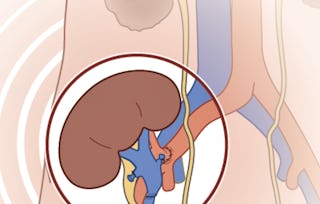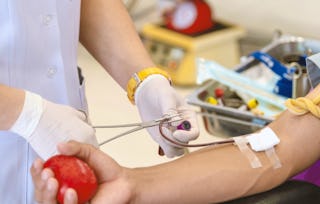Considering someone for organ and tissue donation at the end of life is complicated. The boundary between life and death is more complex than ever before and it falls to medical professionals to help clarify a situation at an often confusing and emotionally stressful time.

Organ Donation: From Death to Life
Seize the savings! Get 40% off 3 months of Coursera Plus and full access to thousands of courses.

1,054 reviews
What you'll learn
The science behind death determination and when it is possible for deceased organ donation take place.
How to ensure the option of organ donation is compassionately explored in all appropriate situations at the end of life in the best way possible.
Details to know

Add to your LinkedIn profile
See how employees at top companies are mastering in-demand skills

There are 4 modules in this course
Welcome to the first week of Organ Donation - From Death to Life. In our first lesson we cover the two absolute prerequisites for deceased organ donation: That the donor must be dead and that there must be consent. Our second lesson takes a look at the history of, and the actual mechanism of brain death as well as the story behind the first heart donor. While our third lesson reviews in detail the scientific determination of brain death, from the preconditions that must be met before testing, to the actual tests themselves, including the role of ancillary tests. Our final lesson will look at the consent process, how to communicate effectively with a grieving family and what is the best way to make the organ donor request.
What's included
17 videos1 reading5 assignments1 discussion prompt
Not all end of life decisions in the Intensive Care Unit and the discussions that go with them can rely on the clarity of a brain death diagnosis. Just under half of all deaths in Intensive Care Units involve non-beneficial treatment being withdrawn or withheld. In less well resourced countries limited access to ICU means these decisions as to when treatment is futile frequently occur earlier, outside of the ICU setting. In week 2 we will discuss end of life care and the ethical principles which help guide us in making difficult decisions in the ICU. What do we do when interventions may prolong suffering with no reasonable chance of recovery? We will see how the dead donor rule can be applied after circulatory arrest and that in certain patients it may be possible to honour their wish to be an organ donor. We will cover the different types of donation after circulatory arrest and go over the process of donation after circulatory death in detail. We will end the week by covering tissue donation and what happens to the body of the donor after the organ donor operation is complete.
What's included
12 videos4 assignments1 peer review
Who can donate? What can be donated? In this week you will learn that the number of potential organ donors is far larger than you ever thought. In the first lesson we look at the organ donation process in detail. We cover the assessment of a donor in terms of infection and malignancy risk and how individual organs are assessed for potential transplant. We look at the monitoring and interventions required to achieve various physiological goals in the organ donor. Managing a potential donor well and dealing with the complications associated with brain death is essential to maximizing the number of organs that are transplantable. It is not markedly different from any critically ill patient with multi-organ failure. We then look at the organ recovery process and how the organs are preserved and transported to the various recipients. In the second lesson the waiting list and allocation practices are discussed in detail so that you can see how donated organs are allocated fairly and how the benefit is maximized. We end the week with an overview of what each recipient operation entails and show you four interviews - all recipients of an organ transplant - given a new lease on life because of one brain dead donor and a family who consented to organ donation in a time of great personal tragedy.
What's included
14 videos4 assignments
Congratulations! You've reached the final week of the course Organ Donation: From Death to Life. Many factors influence organ donation rates across the world - from religion and culture to where you live and what resources are available. In our final week we will take a look at the role of money and travel in organ transplantation and show you the steps being taken to stamp out organ trafficking and transplant tourism. Dr Boitumelo Nkgudi a colleague of mine from Department of Surgery will speak to us on the influence that different religions and cultures have on organ donation. Organ donation comes with a lot of stigma and religious and cultural competence is essential to connecting with potential donor families before asking for consent for organ donation. We will end off our last week by looking at how to assess the true potential of deceased organ donation, what deceased organ donation models exist, and possible strategies to improve them including improving public awareness. Nobody can do everything when it comes to transplantation - but everybody can do something… Enjoy the last week of the course.
What's included
10 videos4 assignments1 peer review
Instructor

Offered by
Explore more from Basic Science
 Status: Preview
Status: PreviewUniversiteit Leiden
 Status: Free Trial
Status: Free TrialUniversity of Colorado System
 Status: Free Trial
Status: Free TrialUniversity of Colorado System
 Status: Free Trial
Status: Free Trial
Why people choose Coursera for their career

Felipe M.

Jennifer J.

Larry W.

Chaitanya A.
Learner reviews
- 5 stars
84.10%
- 4 stars
14.38%
- 3 stars
1.32%
- 2 stars
0.09%
- 1 star
0.09%
Showing 3 of 1054
Reviewed on Dec 22, 2022
Very interesting course, especially for those related with health care, it does have amazing ways of explaining medical terminology, but it is advised to have a previous medical knowledge.
Reviewed on Nov 22, 2023
A comprehensive course laying the foundation and building on the detail so seamlessly. At the end, there is a reasonable framework achieved to approach the concept of organ donation.
Reviewed on Jan 16, 2023
Very informative and I enjoyed learning about organ donation, it convinced me to make the decision to be an organ donor myself, thank you veyr much!

Open new doors with Coursera Plus
Unlimited access to 10,000+ world-class courses, hands-on projects, and job-ready certificate programs - all included in your subscription
Advance your career with an online degree
Earn a degree from world-class universities - 100% online
Join over 3,400 global companies that choose Coursera for Business
Upskill your employees to excel in the digital economy
Frequently asked questions
The course is certified for continuing professional development (CPD) points in South Africa. Send your completion certificate to organdonation@uct.ac.za together with your HPCSA number for 25 general and 5 ethics points.
To access the course materials, assignments and to earn a Certificate, you will need to purchase the Certificate experience when you enroll in a course. You can try a Free Trial instead, or apply for Financial Aid. The course may offer 'Full Course, No Certificate' instead. This option lets you see all course materials, submit required assessments, and get a final grade. This also means that you will not be able to purchase a Certificate experience.
When you purchase a Certificate you get access to all course materials, including graded assignments. Upon completing the course, your electronic Certificate will be added to your Accomplishments page - from there, you can print your Certificate or add it to your LinkedIn profile.
More questions
Financial aid available,
¹ Some assignments in this course are AI-graded. For these assignments, your data will be used in accordance with Coursera's Privacy Notice.

